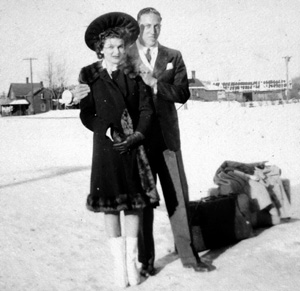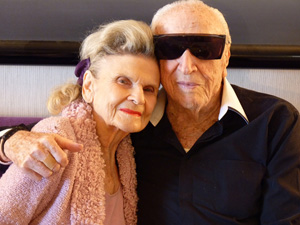
As we head toward Valentine's Day, love is on many people's minds. Many young people fear they will be trapped in a marriage that becomes stale, predictable, or boring. I'm humbled to say that my parents -- Pearl and Seymour Dychtwald -- have been married 67 years and are living proof that such a fate is not inevitable. As you can hear for yourself, their love and acceptance of each other has grown stronger over their nearly seven decades of marriage.
Here's an excerpt from an interview with my parents that appears in a brand new book entitled Secrets of Great Marriages: Real Truth from Real Couples about Lasting Love by renowned marriage therapists Charlie and Linda Bloom.
The Blooms: The Dychtwalds were definitely not made from the same cookie cutter. They appreciate their differences and according to Pearl, "It's not despite our differences that we have succeeded in creating such a rich life together, but because of them."
Pearl: Although we have spent about 99 percent of the past 67 years together, the first three years of our marriage were quite different. Seymour was 21 when we got married in 1942, and I was 18, just out of high school. We were a couple of kids. Six months after our wedding, he joined the army and three months after that he was sent to China, where he was stationed until 1946. I missed him terribly. I lived with my family in Newark, Ney Jersey while he was overseas, but the pain of our separation was great. When Seymour finally came home, I was overwhelmed with happiness. I didn't want to be separated ever again, and that's pretty much the way it's been ever since. The experience provided a powerful lesson about the preciousness of our connection and our desire to do whatever was necessary to sustain and deepen it.

Seymour: We stayed in very close touch while I was away. We wrote to each other every single day. Of course there were no emails in those days and you couldn't make telephone calls, so those letters were our lifelines. Between the two of us we wrote over 2,000 love letters. And we still have those letters today!
Pearl: During our lives, we've had our share of difficulties, losses and illness. One of the things that drove Seymour to focus so intently on earning a good living for our family had to do with his growing up in a very poor family during the Depression.
Seymour: My father left us when I was seven years old, and we never heard from him again. I kept hoping he'd be there for me, but he never was. It was hard. I was the youngest of four children, the baby. I started working for pennies when I was just a kid to help support my mother.
Pearl: Like most members of the Depression-era generation, we grew up with an acute sensitivity to money matters and were driven to earn enough money to provide for the family, which, by 1950, included our two sons, Ken and Alan.
Seymour: My one regret is that I didn't spend more time with the boys. I was so determined to build a successful clothing business that I left most of the child-rearing responsibilities to Pearl. In addition to being my hard-working business partner, she's always been a wonderful mother. I couldn't ask for a better mother for my sons. She's steady, patient, and very loving. I didn't really think about spending more time at home then. It was a different world. Men didn't get so involved with the family back then. If I had to do it over again, knowing what I know today, I'd have spent more time at home.
Pearl: We retired in 1987 and were hoping to enjoy that next chapter in our lives. But in 2003, our lives changed. Because of his diabetes, Seymour developed macular degeneration in his eyes, and his doctor suggested surgery to correct his vision. Rather than restoring vision, the surgery resulted in a loss of vision. He has virtually no possibility of recovery of sight in either eye. He is legally and permanently blind.
Seymour: I'm now unable to drive, read, watch movies, or do most of the things I used to love to do. Yet there's still much I can do because of Pearl. She's become my eyes. She helps me find things, drives me places, and takes care of me in ways that make me feel that my life is still good, that I'm still a productive and worthwhile human being.

Pearl: I am doing what I want to do. This is what I want to do. Caring for you brings me happiness and fulfillment.
Seymour: Pearl and I were faced with a crisis of a different type when the stock market took a big hit in 2001. The stocks that we had been holding lost much of their value. For the first time in almost fifty years, I was scared about not having enough money to keep us for the rest of our lives. I was really worried that we might be in serious financial trouble. For a long period of time I couldn't sleep at night. I was up worrying about what we were going to do.
Pearl: I was never that worried about the finances. I knew that if worse came to worse, we could make some adjustments in our lifestyle and cut back on some of the luxuries we had grown accustomed to without making any extreme sacrifices. It was just a matter of scaling back. We both knew how to live on less. We'd done it before, and if we needed to, we'd do it again. Mind you, there have been times when I've been frustrated with Seymour because he wasn't listening to me or he was upsetting me for some other reason, but I'd usually come up with some way to get through to him.
Seymour: Like when you dumped the bowl of water on my head?
Pearl: I don't even remember what I was upset about, but I was angry, and I just picked up a big bowl of water and poured it over his head. We both agree that it's not enough to just say "I love you," which we do on a daily basis to each other and other family members. We also stress the importance of displaying love through acts of kindness, caring, and generosity. For example, one of the ways that Seymour has come up with is by leaving love notes on the windshield of my car.
Seymour: I started doing it years ago when I knew her car was in the parking lot at the community center. I got a kick out of imagining her coming back to her car and finding that note on the windshield, seeing her smile as she read it. If I had advice to give young people today, it would be to love and respect each other always.
Pearl: And don't forget to remind each other of what you admire about him or her. Marriage is something you have to work at. You can't take the other person for granted. You can't just expect that because you're married, you don't have to continue to be as loving and attentive as you were before the wedding. Expressing my love to Seymour makes me love him more. Don't hold back.
Seymour: And praise your spouse's good points. Emphasize the positive. Oh, and don't forget to have fun.
This interview has been excerpted from Secrets of Great Marriages: Real Truth from Real Couples about Lasting Love by Charlie and Linda Bloom.
Ken Dychtwald, Ph.D. is a psychologist, gerontologist and author of sixteen books on aging, life transitions, and retirement-related issues including Age Wave, The Power Years, and his most recent book, With Purpose: Going from Success to Significance in Work and Life (with Daniel J. Kadlec, Collins Life; 3/09). The founding CEO of Age Wave, he lives with his wife and children in the San Francisco Bay Area.